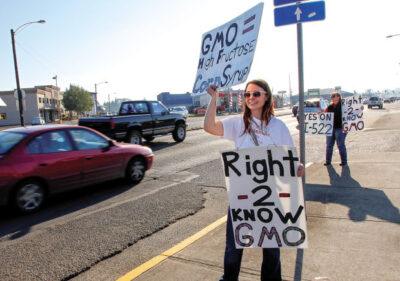
Image source: TDN.com
April 8, 2014
The fight for GMO labeling laws continues across the United States, with half of the states considering giving consumers the right to know.
Food safety advocates and organic farmers are leading the charge to ensure that Americans are aware of what is in the food which ends up on their plates. More than 60 countries around the world already have nationwide GMO labeling laws, and about 80 percent of all food grown and sold in the United States is genetically modified.
Supporters of GMO labeling have experienced close loses in California and Washington in recent years but have not given up, and say it’s only a matter of time before such a proposal becomes law somewhere.
GMO labeling laws have been introduced in 26 states.
Following is a roundup of recent action on GMO labeling bills or initiatives:
- Vermont. The state Senate judiciary committee unanimously approved a GMO labeling bill, moving it one step closer to becoming law. It still must pass both chambers. The House passed a similar bill last year. An excerpt from this year’s bill reads, “Genetically engineered foods post potential risks and for multiple reasons, food produced from genetic engineering should be labeled.” The Vermont Public Interest Research Group Consumer Protection feels that states have the right to protect the health and safety of residents and if passed, the GMO labeling bill would further that goal.
- Colorado. A GMO labeling initiative was recently granted approval to proceed with signature-gathering after the state Supreme Court opted to dismiss a challenge posed by food industry representatives and biotech companies. In order for Initiative 48 to appear on the November ballot, supporters must gather 86,105 signatures from registered voters by August. Right to Know Colorado created the initiative. The food safety group is comprised of organic food retailers, farmers, consumer advocates and general citizens who want to know what goes into the food they eat. “We are pleased that the state Supreme Court ruled in favor of the GMO labeling ballot title, and we look forward to bringing a GMO labeling initiative before the voters of Colorado this fall,” Right to Know Colorado GMO representative Larry Cooper said. If passed, the Colorado GMO labeling law would require that all modified foods possess a label which reads, “Produced With Genetic Engineering.”
Order your 2014 Heirloom Solutions seed catalog and get $20 in your account!
- Hawaii. The state House of Representatives revived a seemingly defunct GMO food labeling bill, although its fate appears dire after it died in committee. Supporters of the bill stated during a state House Agriculture Committee that island residents have the right to know what they are eating. Committee members challenged the text composed and questioned how the state would actually go about enforcing such a law. State Representative Isaac Choy also wondered how officials would determine if a food product had indeed been mislabeled.
- Florida. Florida House Bill 1, if passed, would mandate that all genetically modified raw agricultural commodities and processed food derived from GE ingredients be labeled. The Florida GMO labeling law was introduced by State Representative Michelle Rehwinkel Vasilinda and is currently in committee.
- Massachusetts. A GMO labeling bill in Massachusetts recently passed a significant hurdle. The state Joint Committee on Environment, Natural Resources and Agriculture approved the Genetically Engineered Food Right to Know Act. The measure passed on this session’s deadline for committee approval. Massachusetts Representative Gailanne Cariddi called the passage a “big step forward.” “I myself want to know what I eat,” Cariddo said. The GMO food labeling bill would require all raw unpackaged food be labeled regardless of whether it is placed on a shelf or a bin. The legislation stopped short of mandating the removal of a natural label from GMO food.
Center for Food Safety representative Colin O’Neil said that he expects even more states to become active in the GMO labeling fight, and particularly noted Colorado and Oregon as prime battlegrounds. During the GMO labeling bill battle in California, biotech giants like Monsanto, Syngenta and DuPont spent about $9 million to help defeat the GMO labeling initiative.
“That sent a tremendous signal to consumers. Many were unaware that companies would spend so much to keep consumers in the dark,” O’Neil said.
Sign up for Off The Grid News’ weekly email and stay informed about the issues important to you